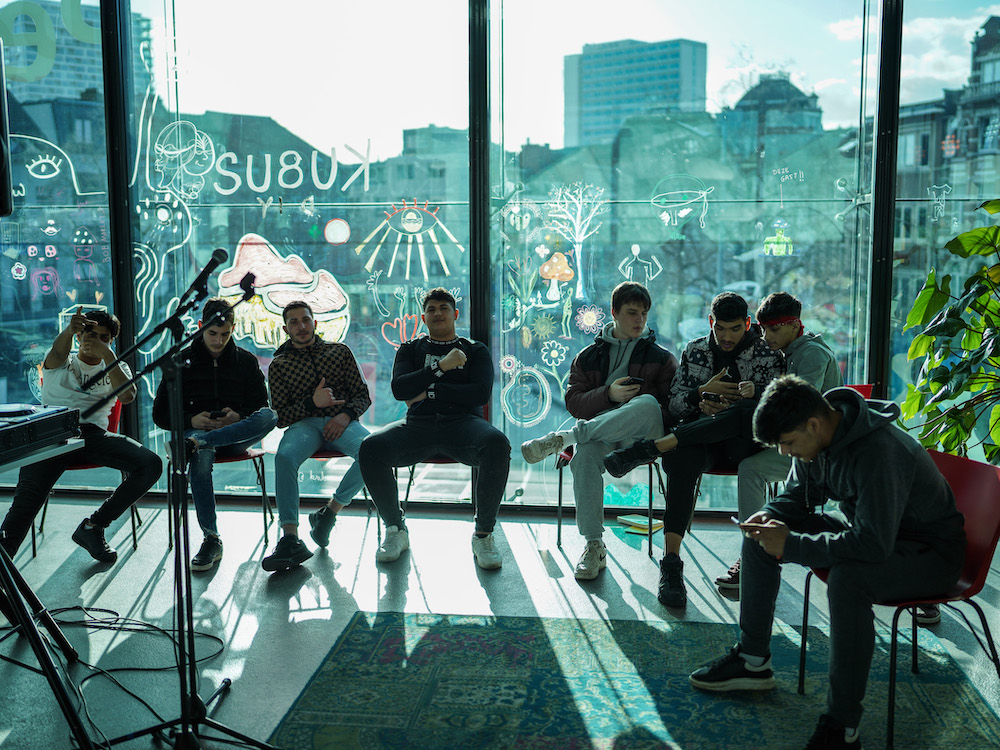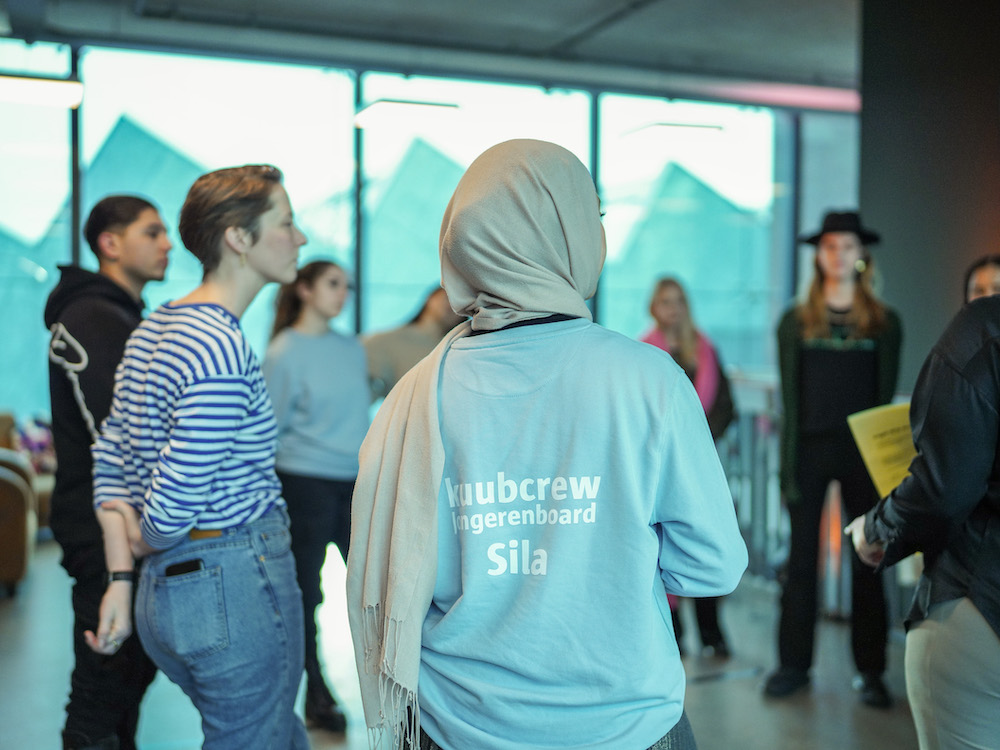A 'proper' library for Antwerp's youth
Give young people space, they will do the rest themselves

For many libraries it is not an easy task to reach young people, but in Antwerp it is getting better and better. Permeke, Antwerp's central library, has had an Urban Bib since 2016, which attracted many young people. At that time youth worker Dries Decru brought hip-hop culture into Permeke, and the young artists and partners who committed to Urban Bib laid the groundwork for a new youth library where young people are given as much space as possible to develop themselves.
Elselien Dijkstra is a philosopher, freelance author, and owner of Zinspeler.
Recent developments
This approach to engage young people in the library as actively as possible was expanded in September 2022 by reserving the kubus (cube) exclusively for young people aged 15 through 25. The kubus is a glass building just in front of the central entrance to the library. In 2021 the library decided to provide content for this former restaurant. Since September 2022, the site has been occupied by young people who meet, study or attend workshops in digital competencies, writing and music. In late February, the kubus had a weekend-long inauguration with a grand opening celebration organised by the young people themselves.
Partners
Thanks to various partners, a variety of workshops will be provided in the kubus. StampMedia, a media organisation of and by young people, is hosting some of their offerings such as workshops about podcasting, photography and video. Mayanaise, a not-for-profit organisation, puts performing arts and writing front and centre, and they host open mic events. Hip-hop collective BelgianGarden conducts workshops about beats, music writing and producing. Saamo Antwerp offers a pathway to support young entrepreneurs. Thanks to these partners, the library manages to reach more and more young people who then find their way to the kubus. Workshops and activities may also be organised by young people themselves, such as the ZineSalon supervised by two young illustrators.
Permeke provides young people with their own building and the confidence to organise their own activities and assemble their own collection.
Speeches
According to Laure Ruts, kubus’s project manager, a form of ownership is now emerging among the young people. "It’s their building, their place. Here they may write on the walls, move the tables. Get themselves a cup of coffee. And when they are done, they do the dishes themselves.”
"The opening party was a great success,” Laure Ruts says. "The young people had organised it themselves as much as possible, they welcomed everyone, they delivered speeches, supervised a live proposition game with the alderman for culture in the city and the needs of young people. That was a very special moment, they really made a stand there. Everyone could see: these young people really have an opinion about culture in the city.”
Youth Board
The main body of the kubus is the youth board, which consists of about 15 active members. "Kubus’s youth board consists of three working groups: the inspirers (bezielers), the collection champions (collectiekanjers) and the project patrons (projectpatsers),” says Laure. "The inspirers are a policy steering committee which translates kubus’s mission and vision into actions. The project patrons deal with programming activities. The collection champions together decide which titles to bring in. For the past year, we have had a non-fiction collection for young people. Together with the collection champions, we have determined themes about which we purchase new titles. These include the themes of identity, climate, gender, becoming independent, religion.” The chosen books will also end up on the shelves of the other library branches.
Identity and discovering your own story.
Outreach
To get young people involved in kubus, Laure has invested a lot. "I have been very outreach oriented. In the first few months, I reached out to many people. Without an agenda, just by talking to young people as much as possible. When classes came to visit, I would go there to have a chat or to brainstorm. When partners organised something for young people, I went there. I started talking to different organisations in the youth and cultural sector and looked for ways to collaborate. And on Instagram I collected a lot of contact information. During the summer, I organised two days in the empty building to ask young people themselves what they wanted to do there.”
As kubus’s project leader, Laure is "responsible for developing and monitoring the DNA of the youth library: what kind of place do we want to be, where do we want to go? And spreading that DNA, within the network of libraries but also more broadly, within the youth and cultural field.”

In terms of theme, Laure sees a common thread in what concerns kubus’s youth: "Identity and discovering your own story. They are at an age when they think a lot about who they are, who their friends are, what their talent is, what they should study.”
Welcome
The fact that there are no adults in kubus really makes the young people feel like it is their own place. "And it is also for the safety of young people. With young people, we really strike up a conversation. We make them feel welcome.”
As a tip for other libraries looking to reach young people, Laure emphasises an open attitude. "It is especially important to speak to young people without pushing your own agenda. Just ask how they are doing. "What keeps you busy?” The bond you cultivate with that helps a lot. When we wanted to organise an activity ourselves in the past it did not catch on. The demand was just not there. By giving young people a place with ownership, they also see it much more as their activity. We make them feel that they are welcome, they do not necessarily have to participate in any activity either. But we do let them know that they are free to try out a workshop.”
Mirror
In Permeke, Laure was able to build on what was already there, she says. "There were already a lot of young people using Permeke as a place to study so they just got an upgrade, and it is not often you have that much time, that much space and that many resources to experiment with young people. I think it is great that the kubus can be an example or a living lab, but I always tell colleagues from other libraries not to mirror it too much and focus on the value of small interventions in their own context, which can already be a lot. But let it be a call to policy-makers and directors to provide space and time for initiatives like these.”
Kubus's youth board consists of three working groups: the inspirers, the collection champions and the project patrons.
Young people talking about their kubus
Keltoum (20): "Sometimes I think to myself how lucky I am, the joy to have people and especially young people around me who all have very big dreams but most of all they dare. They dare to write their own story, dare to chase their own dreams, dare to have an opinion and values and they express themselves effectively. Because it can sometimes take some time to find a place and especially people where things are okay. Okay to not have to do anything and walk your own path without question. I like to call such a place my second living room. Because I feel comfortable but above all supported, just like home but a tad different. Supported to bring out the best in myself without always having to be my best.”
Yasmine (18): "The kubus, a second home, where everyone is welcome and where everyone can do their own thing. Young people are very important to the kubus, they are the reason it was created. The young people want to make sure everyone can feel at home in the kubus. In the youth library, everyone gets the chance to chill out for a while, to study in a comfy place, but also the opportunity to participate in great workshops. Beyond all this, kubus is also a place where young people can get together. Where young people can blossom, be themselves and explore. We as young people are talented. We learn from each other every day. Young people have the power to change the world. And that is what Permeke's Youth Library would like to contribute to.”
Note
- This article is an adaptation of an article previously published in Bibliotheekblad (Library Journal) 5-2023.
































































